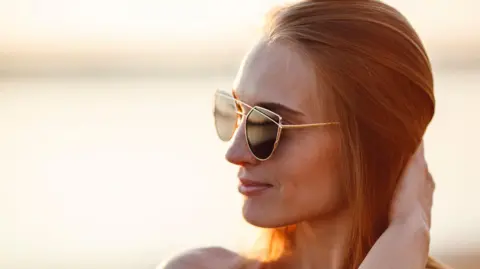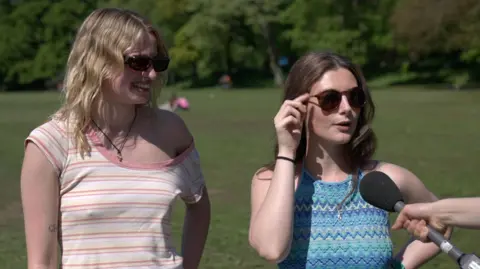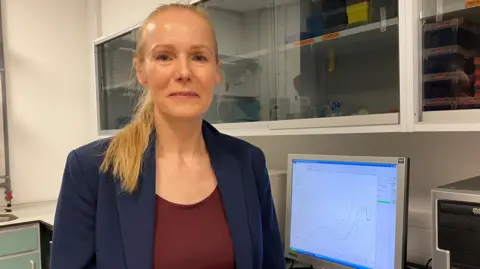Do pricier sunglasses protect your eyes more?
 Getty Images
Getty ImagesWe all know how the sun can age our skin, but experts warn it can also damage our eyesight.
Ultraviolet, or UV, light can lead to a number of conditions that can affect vision, such as cataracts.
Our eyes can even get sunburn.
To avoid eye damage, optometrists say we need to properly protect our eyes when out in the sun, but the good news is that we do not need expensive sunglasses for the protection we need.
Dr Malgorzata Rozanoswka, from Cardiff University's School of Optometry and Vision Sciences, said adequate protection was required, including "proper sunglasses", sun cream with high sun protection factor (SPF) and wide brimmed hats.
"When you are on the beach, there is the reflection of the UV from water, from sand. It could be quite high," she said.
She added people hiking or climbing mountains needed more protection because "the higher the altitude, then the higher UV".
How can UV damage our eyes?
Starting outside the eye, our eyelids are at risk from exposure to the sun, because they are not somewhere we often think about applying sunscreen.
The skin is also susceptible to UV-associated cancers, much like the rest of our body, including melanoma.
Inside our eyes, short-term exposure to UV can lead to photokeratitis, which is like sunburn that affects the cornea, rather than the skin.
This painful condition is also known as "snow blindness" and can affect skiers and climbers who spend time at high altitude.
A lack of protecting our eyes throughout our lifetime can also lead to deteriorating eyesight, increasing the risk of conditions such as cataracts and age-related macular degeneration (AMD).
Dr Rozanowska said increased exposure to sunlight could increase the risk of the retina aging prematurely, as well as other parts of the eye.
"So there is a very well-established association of UV and cataracts, and those cancers of the surface of the eye," she said.

"Honestly, just ones that fit my head, because I've got such a small head. But obviously also to protect from UV," said Hattie from Cardiff, speaking from the city's Bute Park.
Her friend Immy, from Buckinghamshire, added: "For me, it's more like fashion. I don't really think about protection."
Searching for the right pair of sunglasses requires some effort.
In some shops you will notice labels with categories from 0 to 4, referring to how dark the lenses are.
Category 0 sunglasses let a lot of sunlight through, while category 4 are best for activities in more intense sunshine, such as skiing or hiking in mountains.
Category 4 sunglasses block so much visible light that they are not considered safe to drive in.
But darker sunglasses do not mean better UV protection, and you cannot tell by looking at the colour of the lenses how much UV protection is offered.

Dr Rozanowska recommended looking at the certificate on the frame, which could read CE, a European certificate, or UKCA, which are British markings.
These will be based on the same safety recommendations and should block at least 95% of all UV light.
The best to look for is UV400, which blocks 99% of all UV, she said.
"When buying sunglasses, it's worth getting them from reputable sources and look for those certificates on the frame."
Good sunglasses also do not have to cost a lot of money, with some cheaper sunglasses offering as much protection as expensive ones.
Dr Rozanowska said lenses "are probably made from the same material as the very designer sunglasses".
And those fake designer sunglasses we are tempted to buy from a market stall on holiday may look like a bargain, but they may be offering no protection at all from the sun.
"Even though they have very dark lenses, they can transmit a lot of UV light and wearing this type of sunglasses with dark lenses, this would make your pupils dilate and more of that UV light would be transmitted to the lens," she said.
So sunglasses with no UV protection can actually cause more harm to our eyes.
Another thing to consider is that not all sunglasses offer good protection at the side of our eyes - a narrow arm can still allow for UV light to reach our eyes, resulting in eye damage.
Children typically spend a lot of time playing outdoors and their eyes can be more vulnerable to UV damage than adults, said Dr Rozanowska.
She said lenses offered almost no protection from UV, so it was not necessary to force a child to wear sunglasses, instead creating shady areas for play.
"So if you are playing on the grass surrounded by trees, there is enough shadow. That reflection from the grass is like 2%, it's almost nothing.
"It is important for children to play outside without any eye protection. It prevents the development of myopia or short-sightedness."
